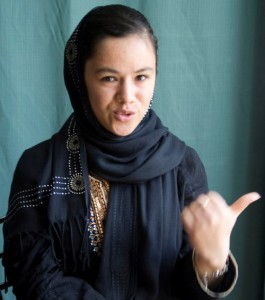The first word a child speaks is often “mother.†When we take our first steps, we balance ourselves by holding our mother’s hand. She is the first person to care for us when we fall, and the first to make us feel strong enough to stand on our feet.
My mother took her role very seriously. She knew it was her responsibility to raise the children and manage the family. She took care of everything. I remember one Eid, my mother surprised my father because she had not only made new clothes for my brothers but for my father as well. She wanted the whole family to sit together for meals. When someone wouldn’t arrive for dinner, she would be disappointed, and would go to their room to call them. She herself never seemed to eat, but when we all gathered, she would give a wide smile, so happy to see us all sitting together.
She gave her sons and daughters the same rights and gave us so much love. Whenever any of us had a problem, she would show us the right way. We called her Mame Jan at home; it sounded childish but we all loved to call her by the endearment. When there were family problems, it was my mother who made sure that everyone gave their ideas, even me, too young to suggest anything. Still, my mother would always encourage me to think and participate.
While we all used to spend time with her, I, especially, was always with her. My mother taught me everything, even when I was young, from the most basic to the most complicated. She taught me how to be responsible and how to take care of myself. She always said, “I am not always with you. You’re the only person who can help yourself. I can only guide you to show you the right way.â€
When she worked around the home, she did so very carefully. She would ask us for help and sometimes she got angry when one of us didn’t do what she said. She especially hated hearing lies about why, but she learned to admonish us gently. Honesty and forthrightness were very important to her. She wanted everyone to be truthful, and she followed this belief at the school where she worked. She tried to teach the teachers and students to be honest, and as she was strict like a headmaster, they respected her and followed the rules. In her job she was very serious, even with me when I was in that school; she would behave with me the same way she did with other students. But at home she was all smiles.
In 2007, I lost her to a car accident. It was a total shock. The world stopped. Losing the most valuable person in my life was like losing my mind, and it was hard to accept the reality of it. Once, she said, “We can’t do anything against God because God does whatever he wants and life leaves us turn by turn.â€
Still, I felt her loss deeply. I had spent almost every moment with her. When I went to school in the mornings, she prepared my breakfast, and when I came back, I would tell her everything I had done in school that day. I loved her so much, and remembering these moments would hurt me. But my mother had made us ready through her life lessons, and we learned how to live in a future without her. I felt weak, but at the same time, strong—because I would have to become like her and follow in her steps. I had never imagined that one day she would leave me and I would have all the responsibility for my family. One of my sister’s was already married, and one was at home. I am younger than she is, but she got engaged and, as I have brothers, it became my responsibility to help my family.
At the beginning, it was very difficult. Preparing my sister’s wedding was a big responsibility. It had been my mother’s wish that my sister marry. Since my mother was gone, I had to prepare everything, such as her traditional Afghan wedding clothes. I did my best and acted as my mother would have. In this way, I showed that my mother’s spirit and teachings were alive. Instead of crying, I smiled. Although I was sad inside because I was preparing the wedding celebration alone, I could feel my mother guiding me.
I remember her smiling face whenever I am sad, and her soft voice comes to me, telling me not to lose my courage. I try to follow her way of being brave. I remember everything about her, and I do what she told me. I try to be like her—walk like her, with dignity and grace, and talk like her, being very serious. Whenever she talked, she gave everyone hope word by word. When she spoke with others, she spoke nicely, and could always convince people of anything.
This is the thing: I wanted to be like her, serious and responsible, and somehow, now, I am
By Shogofa
See also “The Walk” by Shogofa

0 Comments